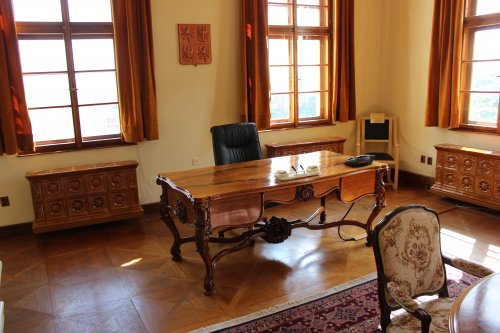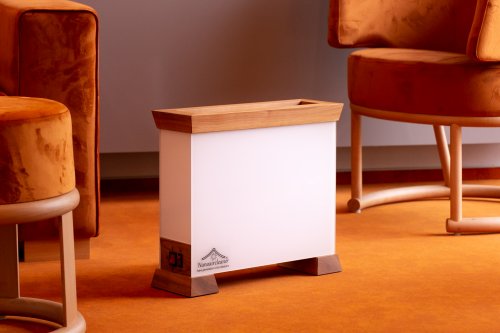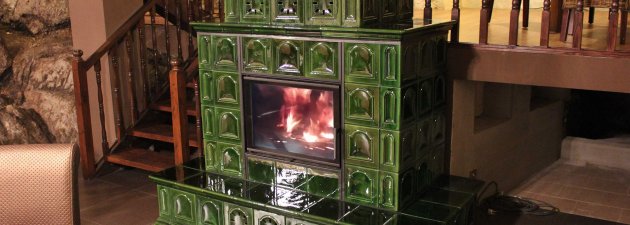It all began in a small workshop in the early 1990s, without any capital but with a lot of enthusiasm. A small family company, Retap first started its business in metal production, then some ten years later, they went on to manufacture their own tiles and tiled stoves. Seven years ago, Retap launched their unique nano air cleaners in the Czech market and abroad. Last year, they won the Family Company of the Year award in the Small Business category.
Traditional and modern technologies combined
The company has become renowned in the industry as the only Czech manufacturer of tiled storage heaters and tiled convector heaters. For over twenty years, their main product are ceramic tiles, fireplace inserts and tiled stoves. Retap supplies custom-made tiled stoves not only to private sector clients, but also to public institutions. Their electric tiled storage heaters are placed in Český Krumlov Castle or Hrzánský Palace in Prague.
"To meet the high quality standards, we have invested in new production technologies, such as robotised welding workplace, press brake and plasma firing device," says Retap founder Miloš Heršálek.

Do what few others can do
When theoretical physicist Richard Phillips Feynman outlined the possibilities of nanotechnology use in 1959, his vision may have seemed like wild fantasy. By the end of the 20th century, the idea was slowly becoming reality and was deemed more feasible. Miloš Heršálek was excited about this new, accelerating field so much that he decided to expand his product range to include nanotechnology-based air cleaners. The company collaborated on their development with the Technical University of Liberec, J. Heyrovský Institute of Physical Chemistry and UCT Prague. When the project – which was financed by the Technology Agency of the Czech Republic – ended, Retap, as the owner of the patent and certificate, started producing nano air cleaners using so-called nanophotocatalysis.
"With the photocatalyst, the air is cleaned only by the action of light on the photoactive filter, which does not require maintenance and cleaning. Our technology has no competition yet, home or abroad. Other manufacturers use expensive fixed HEPA filters that can capture viruses, bacteria and fungi only up to 0.2 micrometers. Which is not enough for harmful micro-organisms of nano size," Miloš Heršálek points out.
Another project from the TA CR programme co-financed the development of a recuperation unit with a nanophotocatalytic cleaner. The project was successfully completed last December, after two years, and it includes a utility model and a Czech patent. Retap has recently applied to the Ministry of Industry and Trade for a grant to finance the company’s own R&D project of a recuperation unit with nano cleaning and geothermal heat utilisation.
R&D and all production took place in Retap's premises in Kněžmost near Mnichovo Hradiště. Now it is located in Hajniště near Nové Město pod Smrkem. Electrical components are imported and so is titanium dioxide, which the company imports from Japan. The products have been successfully tested in independent certified laboratories, health institutes, at the Institute for Nanomaterials, Advanced Technology and Innovation of the Technical University of Liberec, at Certech Seneffe in Brussels and the like.
In cooperation with the Institute of Inorganic Chemistry of the Czech Academy of Sciences and the National Institute of Public Health, the company submitted an application to Epsilon, TA CR’s programme supporting applied research and experimental development, for a new technology called anthropogenic recuperation. Many other use cases for the nanophotocatalytic filter are opening up in the healthcare or transport sectors.

"Our nano cleaners are the only ones in the Czech market that have proven track record in eliminating viruses, including coronavirus, bacteria, fungi, allergens, carcinogenic VOCs and other pathogens. They differ from other products in the category in that their filters do not simply capture impurities. They decompose them straight away," Mr. Heršálek emphasises.
Hard to expand without personal contacts
The biggest export challenges according to Czech companies include exchange rates, rising transport costs, insufficient production capacity and complex regulations in export markets. "We may well have innovative products with top-notch design that meet the highest health requirements, and we may have been successful on the domestic market. But as a small business with fifteen employees, we are most troubled by the limited possibilities to enter foreign markets more dynamically. We have delivered our products to Poland, Croatia and Germany and managed to establish good contacts in the US, where we have sold ten nano cleaners as samples. However, for a more large-scale expansion, what we lack is a network of personal contacts. We simply don’t have enough workforce to build such a network," the owner points out.
Written by Věra Vortelová
Photo credits: Retap



